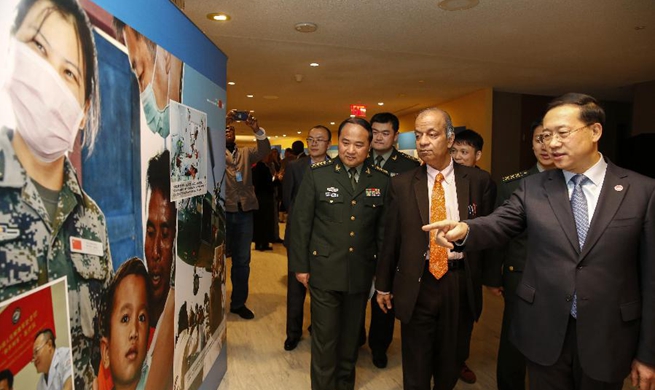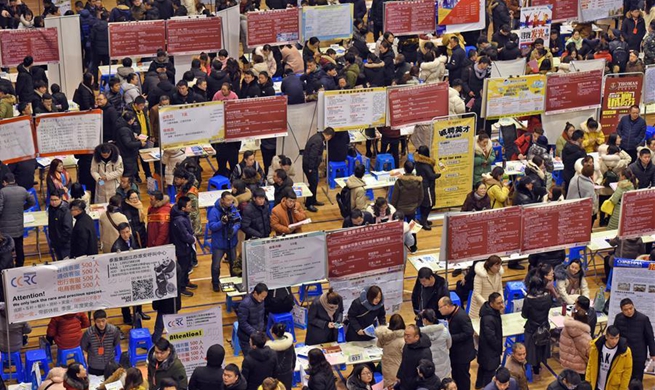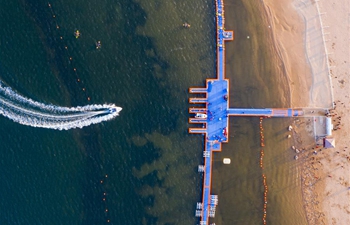WASHINGTON, Feb. 12 (Xinhua) -- The United States will co-host with Poland a meeting on peace and security in the Middle East in the Polish capital Warsaw on Feb. 13-14, according to a joint statement by the two countries.
Analysts argued that both countries have their own axes to grind. Washington seeks to rally international support at the meeting to isolate Tehran, while Warsaw craves closer ties with Washington and a higher position in the world affairs.
With the absence of some major stakeholders and all-round skepticism, the meeting is unlikely to see substantive progress on a wide variety of issues.
"BASHING IRAN"
During his trip to the Middle East this January, U.S. Secretary of State Mike Pompeo said the meeting "includes an important element of making sure that Iran is not a destabilizing influence."
Iranian Foreign Minister Mohammad Javad Zarif dismissed the planned meeting as an "anti-Iranian circus event" and a "desperate" show that will only disgrace the participants.
The objective of the Trump administration was to rally international support at the conference to isolate Iran diplomatically and economically, said Ahmad Majidyar, a senior fellow and director of IranObserved Project at the Middle East Institute, a Washington-based think tank.
Yet many U.S. allies in Europe are unwilling to participate in the event, said Majidyar.
In an opinion piece, Roula Khalaf, deputy editor of Financial Times and an expert on Middle East issues, wrote that this meeting intends to create an anti-Iran coalition which consolidates the impression that the world has lined up behind Trump's hardline approach to Iran.
Some speculated that the conference is targeted at overshadowing Iran's 40th anniversary of the victory of the Islamic Revolution in the same week, said Ellie Geranmayeh, deputy director of the Middle East and North Africa Program at the European Council on Foreign Relations (ECFR).
"It is not the most outrageous foreign policy idea peddled by the Trump administration. But, in the raft of schemes rolling out from Washington, it is probably the most pointless," Khalaf said.
WHY POLAND?
Given Warsaw's limited political and economic stakes in Iran and the Middle East, analysts observed that the motives behind the Polish government to hold this event are not related to Iran.
Robert Czulda, an assistant professor at the University of Lodz in Poland, argued that Warsaw's decision to host the summit "might be unprofitable for Poland in the longer term, for now it is purely political and driven by pragmatism."
"Although Warsaw wants good relations with Tehran, economic cooperation with Iran is minimal while close ties with the United States are crucial" and its main rationale is to bear the cost of strained relations with Iran to please the White House, he said.
"Hosting a summit on the Middle East, Polish decision-makers believe, would be not only a chance to make the American administration happy ... but also another step in moving Poland to the next level in international affairs," he added.
Echoing Czulda, Piotr Buras, director of the Warsaw office of the ECFR, said that the Polish government has "encouraged this reading of the situation by emphasizing the symbolic role of the event for Poland's rising position in the world and strategic cooperation with Washington."
"What worries me is that the Polish government is putting its eggs almost completely in Trump's basket ... All of this is at the expense of relations with EU (European Union) partners, and even at the expense of NATO (North Atlantic Treaty Organization) unity," he added.
"No western European capital is likely to hold an anti-Iran conference. Poland, ruled by a nationalist government, wants to curry favor with the United States," Khalaf said.
Despite Polish insistence that it follows the European line and is supportive of the Iran nuclear deal, the United States would be able to portray the summit's Warsaw venue as a crack in the EU position on Iran, she added.
BLEAK PROSPECT
The United States has invited over 70 countries to the conference, but many countries declined to attend or planned to send low-level representation.
Russia declined the invitation. The foreign ministers of Germany and France reportedly would not appear in Warsaw. Federica Mogherini, EU High Representative for Foreign Affairs and Security Policy, is also staying away.
British Foreign Secretary Jeremy Hunt confirmed his attendance, but only on the condition that a meeting on Yemen would be arranged on the sideline of the conference, according to a report in The Guardian.
European powers do not want to side with Washington to scrap the nuclear deal through coercive diplomacy and sanctions, said Majidyar. "It is unlikely that the meeting will bridge the gulf between the United States and Europe on the broader Iran policy."
Polish Foreign Minister Jacek Czaputowicz announced on Monday that over ten Middle East countries including Saudi Arabia, Bahrain, Israel, Yemen, among others, have confirmed that their delegations will be led by ministers. Egypt and Tunisia are likely to send vice-ministers, he added.
At best, the conference will be a waste of time for all participants; at worst, it will be a provocation that drives Iran to rethink its commitment to the nuclear deal, said Khalaf.
The upcoming Warsaw conference "has all the makings of 'a show about nothing,'" said Aaron David Miller, vice president for New Initiatives at the Woodrow Wilson International Center for Scholars. "And given the amount of effort and time to organize, it's a fair question to ask why it's taking place at all."













